The head of the Polish Ministry of Foreign Affairs, Radosław Sikorski, expressed his deep disappointment over the lack of appropriate influence by President Andrzej Duda on his US counterpart, Donald Trump, to push for more decisive actions in applying pressure on Russia

In an open interview, the politician emphasized that he expected a more active stance from the Polish leader in shaping global policies regarding Russia’s aggression, especially in the context of assisting Ukraine. Instead, according to Sikorski, Duda did not use his closeness to Trump to mobilize strong international support against the Kremlin and proved to be diplomatically limited. He highlighted that, unfortunately, the Polish president was unable to persuade the former American leader to utilize more diplomatic or economic levers to curb Russia’s aggression, which, in the opinion of the Polish diplomat, is a significant loss for Poland's and the region’s security and stability. “I hoped that Duda could leverage his connections with Trump to influence his decision to increase diplomatic pressure on Russia. However, it appears that such a discussion never took place,” Sikorski noted. He also added that he had publicly and privately proposed greater active participation by Poland and its leader in forming an international anti-Russian stance. At the same time, the politician expressed the hope that “friendly and neighborly relations” between Duda and Trump would contribute to protecting Polish interests on the global stage and strengthening the country’s position on political issues. “It’s deeply regrettable, but unfortunately, today we see that these ‘friendly relations’ have not yielded the expected results regarding influence on U.S. policy in the context of Russian aggression,” Sikorski affirmed. The head of the Polish Ministry of Foreign Affairs emphasized that one of the main challenges for Poland is the insufficient activity of the Polish leadership in a unified foreign policy against Russia. According to him, it is now crucial for President Duda to show more initiative and political will to actively involve the United States in resolving the conflict in Ukraine and deterring Putin’s aggression. He stressed: “Now, perhaps at the last moment, it’s necessary to sacrifice political ambitions to do everything possible for peace, to support Ukraine, and to contain Putin. This is a priority that should not be sidelined for political or partisan interests.” The background of this conflict was a recent statement by Ukrainian President Andrzej Duda, who voiced in Zhytomyr that Ukraine “will have to make concessions in a certain sense, as it is likely to happen.” Sikorski sharply reacted to Duda’s statement, comparing his words to a treacherous political game, and called on the Polish leader not to follow the path of Chamberlain or Chamberlain-like figures, who, in his words, in the 1930s, made wrong decisions that led to even greater destabilization in Europe. Thus, the recent days and weeks again highlight the importance of internal political unity and the active role of Polish leadership in global diplomacy regarding Russia. Experts believe that direct influence on American leaders will only yield positive results if the Polish authorities can unite their efforts and work more persistently to support Ukraine, striving for a quicker de-escalation of the conflict and the pursuit of peace. According to Sikorski, the lack of such activity threatens to increase geopolitical risks for Poland and the entire region, especially in the context of a possible new escalation of the conflict between the West and Russia.

